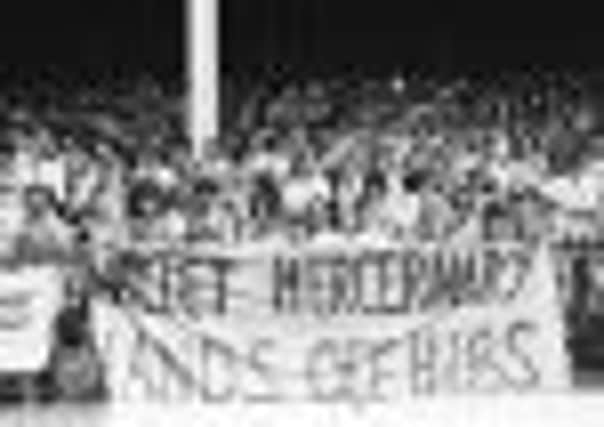Alan Pattullo: Survivors offer a glimmer of hope


WITH a fine sense of timing, Motherwell proved that there is life after administration when they produced a set of accounts that showed the Fir Park club made a profit of more than £500,000 during season 2010-11.
Motherwell went into administration in 2002 when losses were about £2 million per year, and the club has steadily been built back up again to its current position of relatively rude health. It is a hard lesson that Rangers have only just begun to learn.
Advertisement
Hide AdAdvertisement
Hide AdMotherwell were not the first Scottish club to sail so close to the wind, and they were never going to be the last. Some have reached the other side leaner and meaner, one didn’t even get there, and others continue to be weighed down by the burdens of the past.


Hibernian
After severe mismanagement in the 1980s Hibs were on the brink of financial ruin in 1990, which prompted Hearts chairman Wallace Mercer to draw up his notorious merger plans. The fans’ group Hands Off Hibs was formed in response and Tom Farmer, then owner of the successful garage firm Kwik Fit, was encouraged to take a controlling interest in the club as a gesture to Leith, where he grew up.
Surprisingly, Sir Tom still owns the club more than 20 years later though he has, periodically, come under fire for refusing to invest more heavily in players. However, under his stewardship the club’s debt has been reduced to about £5 million, when once it was about £17 million. Although on-pitch success has been hard to attain, Hibs fans only need to look at the crisis presently engulfing Rangers to know that it could be much, much worse.
Morton
The Greenock club diced with death just after the turn of the millennium as owner Hugh Scott battled debts of more than £500,000, before finally calling in the administrators. Fans’ group Save the Ton, led by Professor Jim Picket, helped save the club, with confectionary tycoon Douglas Rae providing most of the funds. The club won the Third Division title in 2003, the first full season after the rescue. Rae is the current chairman and although the club have still had their financial ups and downs, and have flirted with the idea of part-time football, they have settled in the First Division.
Motherwell
Posted a £500,000 profit yesterday having been close to liquidation in 2002 after an ill-considered splurge on the playing squad in the late Nineties. John Boyle was owner then and was blamed for administration befalling the club ten years ago. Boyle, who made his money from travel firms, returned to take charge and estimates he lost a total of more than £10 million in the club when stepping down last year, handing over the majority of his shares to the Well Society in what was the first fans’ ownership scheme in the SPL.
Dundee
The Dens Park club were another fated to pay for a spend-to-accumulate policy at the start of the millennium. The collapse of the transfer market saw them saddled with debts of more than £20 million when the club went into administration for a first time in 2003. Seven years later it happened again, following promises of investment from businessman Callum Melville which never materialised. Now following a fans’ owned model, the club’s supporters’ trust, the Dundee FC Supporters’ Society, are the majority shareholder. Dundee, who are currently fighting for promotion to the Scottish Premier League, are committed to transparent financial reporting and published their latest such update earlier this month.
Gretna
Shot up through the leagues thanks to the financial backing of self-made multi-millionaire Brooks Mileson and after being admitted to the Scottish Football League in 2002 in place of Airdrieonians. However, a brain illness in 2008 saw his assistance withdrawn and Gretna fell back to earth after just one season in the Scottish Premier League. He died in late 2008, by which time Gretna had been placed in administration and relegated all the way down to the Third Division. They resigned from the SFL in the same summer and were liquidated in August 2008. A new club, Gretna 2008, now play in the East of Scotland league.
Livingston
Another club to have experienced administration on two different occasions. The club, who were formed in 1995 out of the ashes of Meadowbank Thistle, first came under threat in 2004, when they won the League Cup while in administration after racking up debts of more than £7 million.
Advertisement
Hide AdAdvertisement
Hide AdSlipped into administration again in 2009 after an ill-starred period spent in the ownership of Italian businessman Angelo Massone. This saw the club demoted from the First to the Third Division but they have come back stronger. Former Cowdenbeath chairman Gordon McDougall bought the club in 2009, together with Neil Rankine. Have recovered to the extent that they are currently in mid-table in the First Division. Earlier this week John Collins and John Hughes were appointed as the club’s new management team.